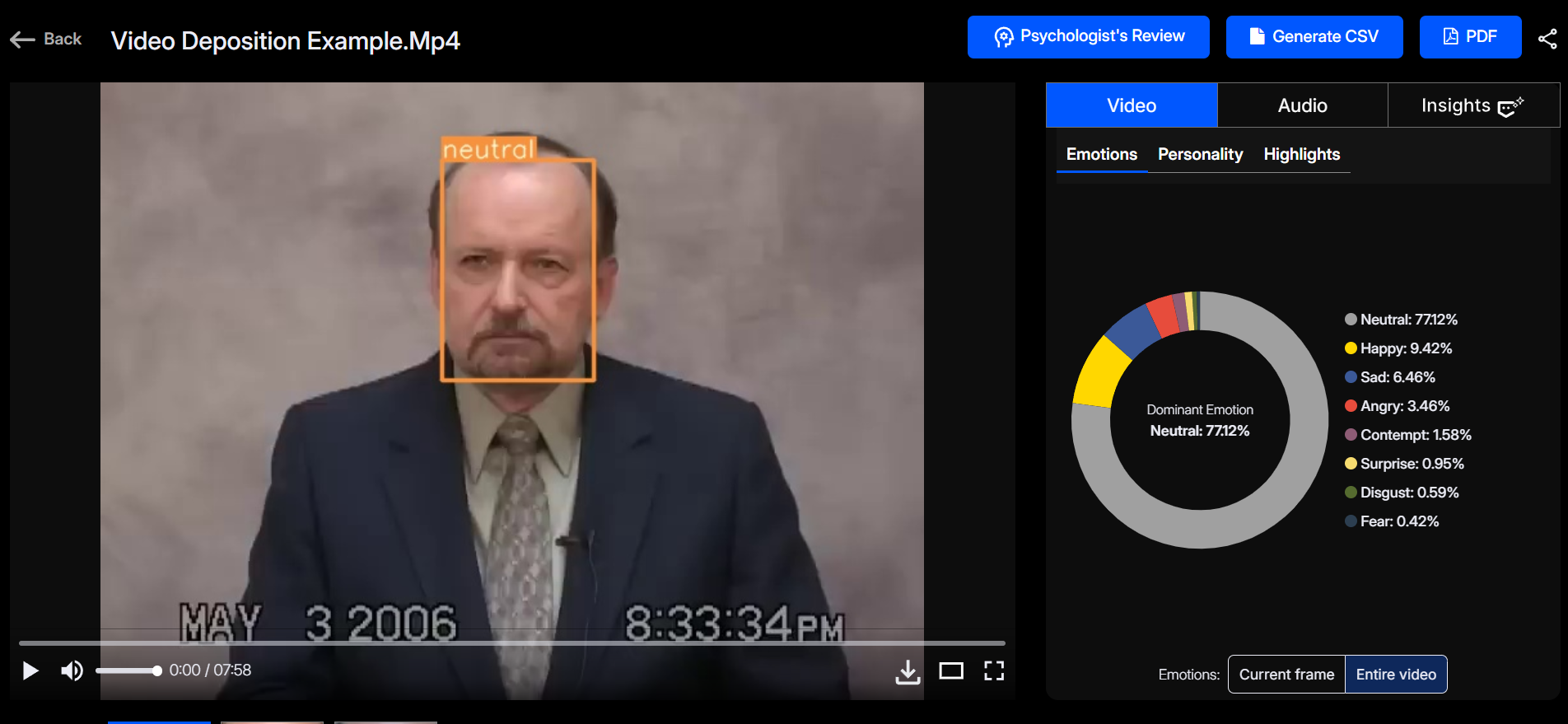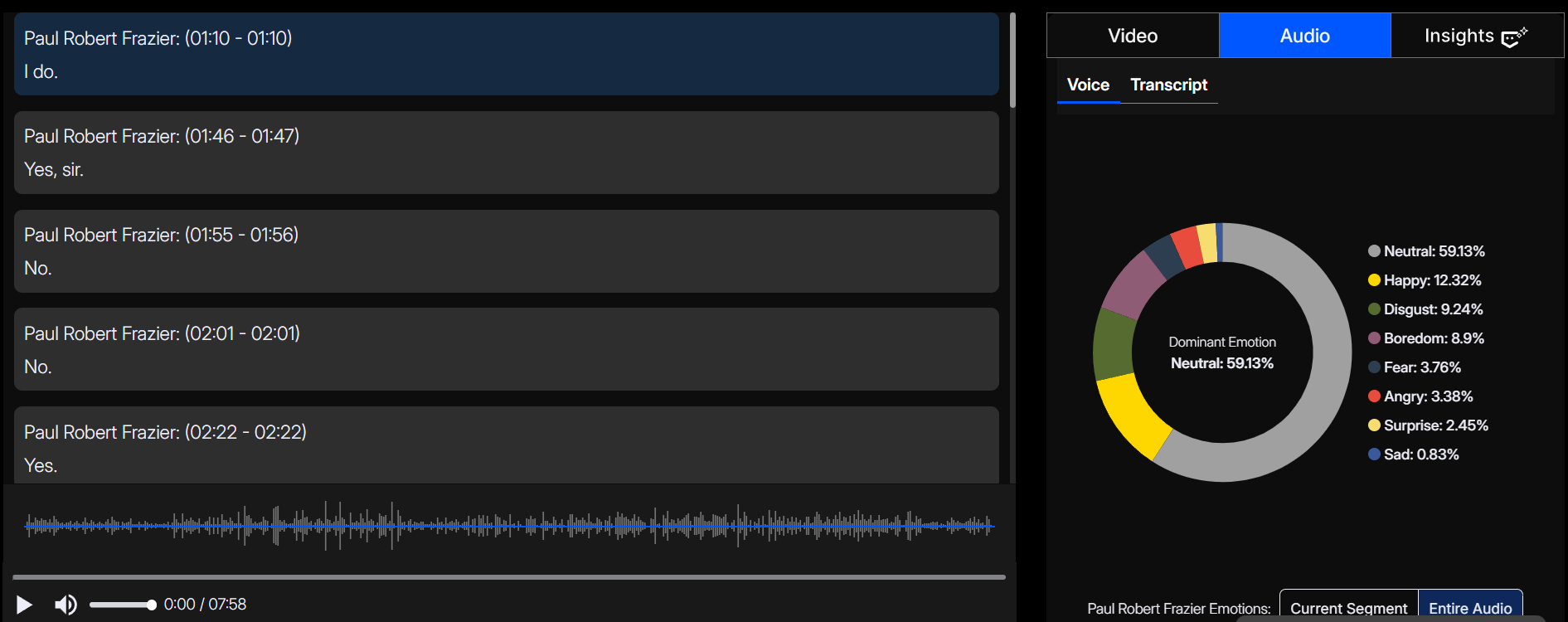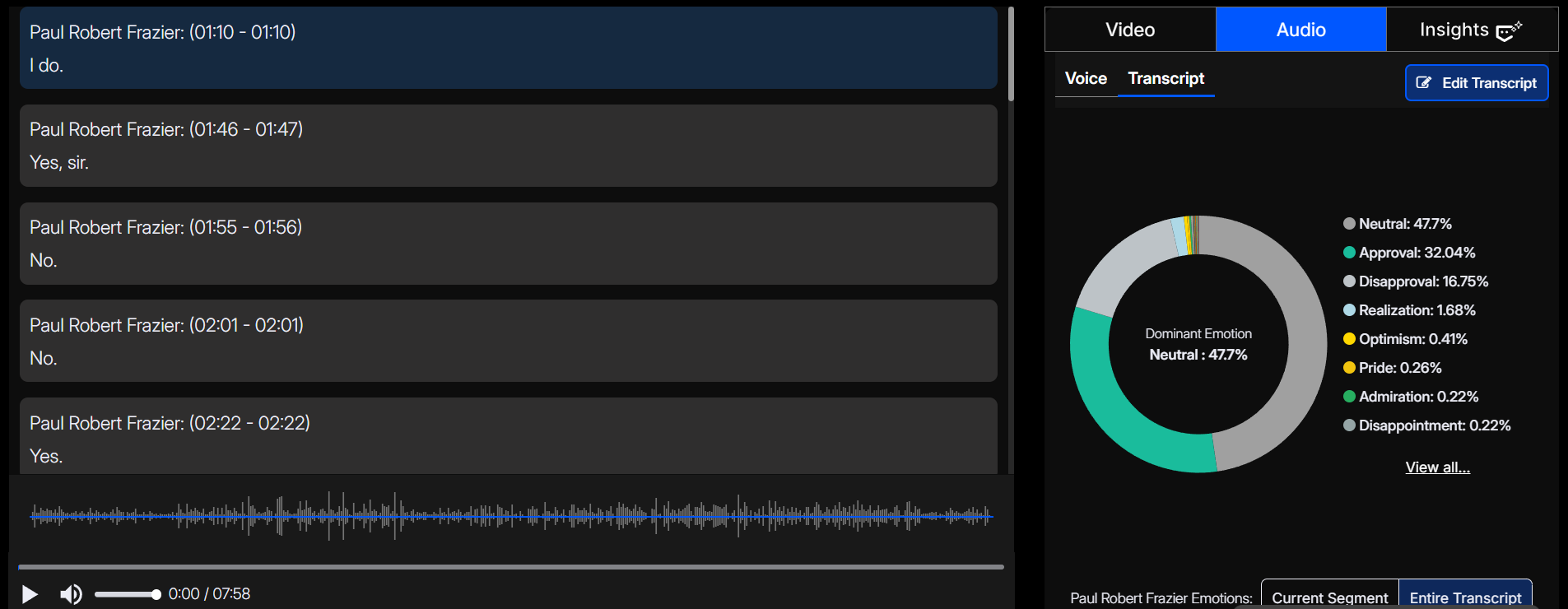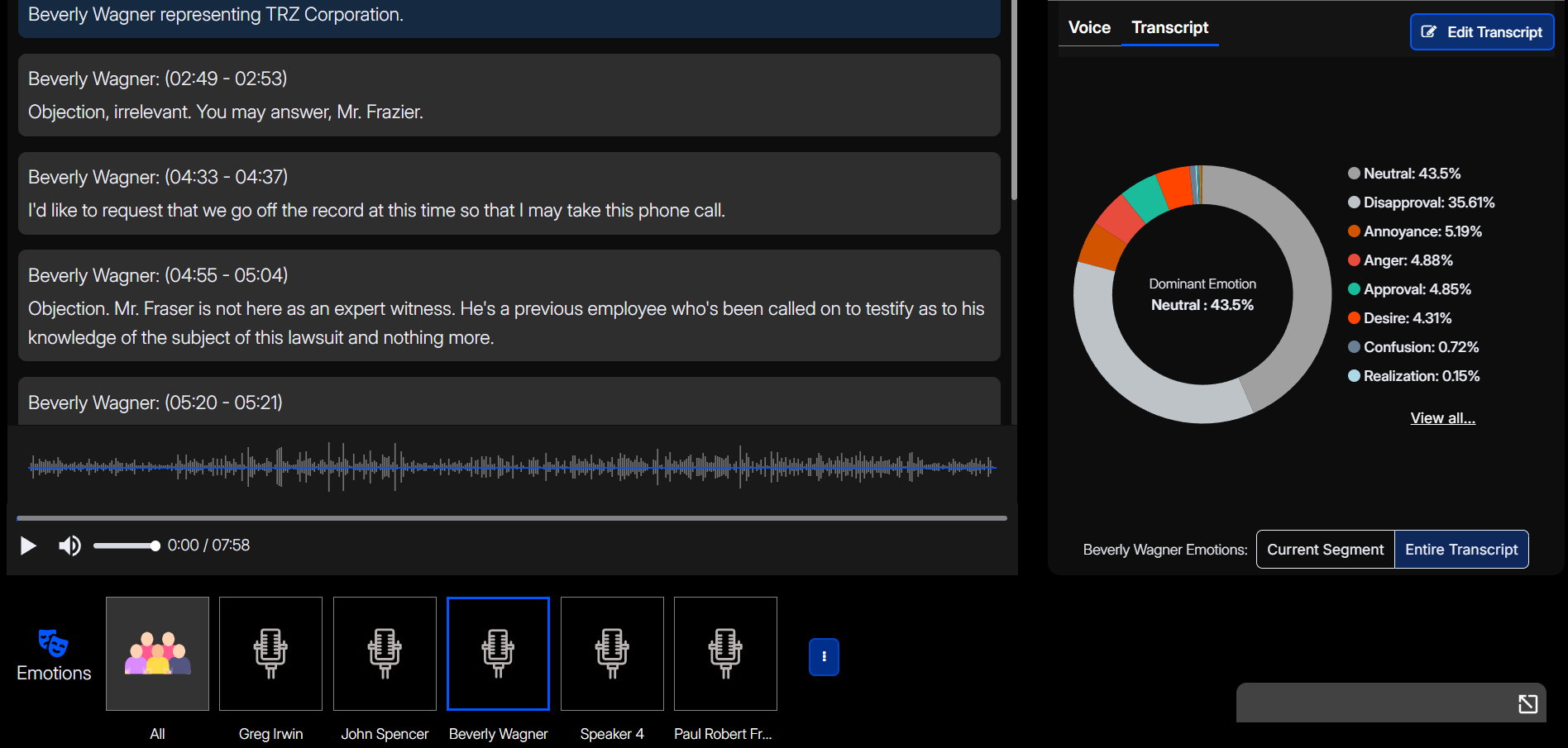%201.jpg?alt=media&token=d4f62788-1c36-43c0-aabc-2b4f809051ed?w=3840&q=75)
AI in Legal Depositions: Supporting Attorneys with Deeper Context
In legal proceedings, depositions are often the backbone of a case. They capture testimony outside the courtroom, giving attorneys insight into a witness’s perspective long before trial. Every word spoken in a legal deposition is recorded, but seasoned attorneys know that words alone rarely tell the whole story.
Tone, hesitation, facial expressions, and even the rhythm of speech can reveal layers of meaning that a transcript cannot capture. Yet reviewing hours of video to uncover these subtleties is exhausting and subjective. Attorneys may differ in what they notice, and critical signals can easily be missed.
This is where technology can lend support. With Emotion AI and personality analysis, depositions no longer remain just written records of testimony; they become richer sources of behavioral context. Imentiv AI helps attorneys a way to see beyond transcripts, highlighting moments that deserve closer attention and helping legal teams prepare with a deeper perspective.
The Challenges of Traditional Depositions
A deposition is designed to preserve facts. A witness swears to tell the truth, attorneys ask questions, and everything is recorded. But in practice, the process is far more complex.
1. Hours of ReviewA single deposition can produce lengthy transcripts and hours of video. Reviewing this material thoroughly takes significant time and resources.
2. Subjective Judgments
Even experienced attorneys interpret behavior differently. What one sees as confidence, another may view as defensiveness
3. Missed Signal
Nonverbal cues like small pauses, micro-expressions, or nervous tone shifts are easily overlooked in real time.
4. Cognitive Bias
Everyone brings unconscious bias into interpretation. This can shape how testimony is understood and used in strategy.
The result? Valuable signals may be missed, leaving only part of the story on the record.
What Emotion AI Brings to Depositions
Emotion AI doesn’t replace attorneys or interpret guilt or credibility. Instead, it acts as another lens, one that picks up signals across multiple channels (video, audio, and text) at once.
- Emotional Patterns: Identifying moments where a witness shows signs of stress, unease, or confidence.
- Voice and Tone Cues: Picking up on subtle hesitations, changes in pitch, or unusual emphasis.
- Personality Trait Analysis (OCEAN): Using the Big Five model (Openness, Conscientiousness, Extraversion, Agreeableness, Neuroticism) to highlight tendencies in communication and behavior.
- Consistency Checks: Spotting mismatches between spoken statements and nonverbal signals that may deserve a closer look.
- AI Insights: Helping attorneys ask context-specific questions and get clear answers backed by emotional and behavioral signals.
These insights don’t replace legal expertise. They provide a richer context for attorneys to draw from.
Case Example: Analyzing a Legal Deposition Video
To see how Imentiv AI works in practice, let’s look at a short deposition video example made publicly available on YouTube.
The deposition involved Paul Robert Frazier, a former chief engineer, who was questioned about his role in waste disposal decisions. Attorneys John Spencer and Beverly Wagner represented the defense and plaintiff sides, respectively. The session was filmed with a court reporter and video specialist present.
On the surface, the exchange seemed straightforward. Questions were asked, objections were raised, and the witness gave his answers. But when the recording was processed through Imentiv AI, new layers of context came into view.
Emotional Profile Across Channels
The video analysis suggested that Frazier’s facial expressions were predominantly neutral (77.11%), but not entirely. Small signals of happiness and sadness appeared during certain exchanges.

His voice told a slightly different story: while neutral overall (59.13%), moments of happiness (12.32%), disgust (9.24%), and even boredom (8.9%) surfaced.


Put together, the three channels painted a picture more nuanced than a transcript could provide. The witness appeared steady on the surface, yet his tone and word choices hinted at tension beneath.
Signals from the Attorneys
Interestingly, the attorneys themselves revealed patterns, too. The defense attorney, John Spencer, displayed strong curiosity in his questioning, paired with occasional disapproval, a style that sought to probe and challenge.
.png?alt=media&token=7daed656-8fbb-412c-bbff-4d46cf0360a2)
The plaintiff’s attorney, Beverly Wagner, leaned heavily on disapproval signals, consistent with her frequent objections and challenges to the defense’s line of questioning.

These dynamics matter because depositions are not just about what witnesses say; they are about the entire interaction. AI helps surface those dynamics in ways that are otherwise easy to miss.
Why Emotion AI Insights Matter for Attorneys
For an attorney preparing for trial, these insights don’t provide verdicts.
However, they do raise important questions:
- When Frazier showed neutrality in expression but unease in voice, was he distancing himself from responsibility?
- Did his alternating approval and disapproval suggest internal conflict over the answers he was giving?
- Could a jury perceive his manner as confident, defensive, or coached?
Each of these is a line of thought that could guide follow-up questioning, influence cross-examination strategy, or shape settlement decisions.
How Attorneys Can Use These Insights
Imentiv AI is not about replacing legal expertise. It is about giving attorneys more to work with as they prepare their cases.
- Deposition Preparation: Attorneys can focus on flagged segments where emotions shifted, saving time in review.
- Cross-Examination: Stress markers or moments of hesitation can guide sharper, more targeted questioning.
- Witness Perception: Personality trait analysis, based on the Big Five (OCEAN) model, can offer a preview of how a witness might come across in front of a jury, whether reserved, agreeable, or defensive.
- Settlement Decisions: Knowing when a witness appeared uneasy or inconsistent may help shape negotiation strategies.
Instead of replacing the careful judgment attorneys bring, the AI provides a clearer map of where that judgment may matter most.
Looking Toward the Future of Depositions
The evolution of depositions has always been tied to technology. At one time, written transcripts were the sole record. Later, video recordings added a new dimension. Now, AI-powered analysis adds yet another layer — one focused on the subtleties of behavior and interaction.
The example of Paul Frazier’s deposition shows how even a routine session can reveal more when viewed through this lens. What seemed like neutral testimony became a more complex narrative of approval, disapproval, and emotional undercurrents.
For attorneys, this shift doesn’t change the fundamentals of legal practice. It simply enriches the material they already work with, offering a deeper context for strategy, preparation, and presentation.
Conclusion
Depositions are designed to reveal truth, but much of that truth lies between the lines. Using Imentiv AI, legal teams can uncover signals that enrich their understanding of testimony.
By combining multimodal analysis, personality trait analysis, and AI insights, Imentiv AI turns depositions into more than just transcripts and recordings. It makes them a deeper source of context, helping attorneys prepare sharper strategies and anticipate challenges more effectively.